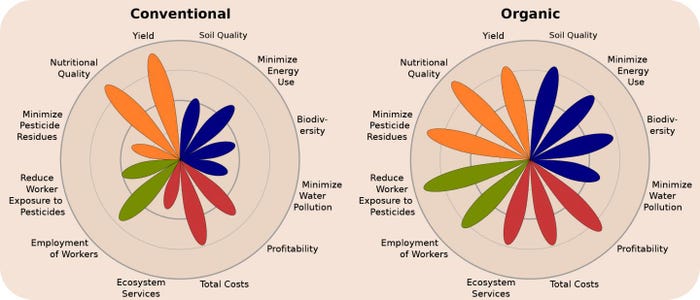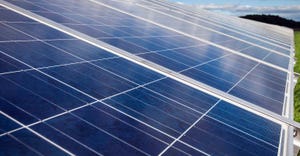Study analyzes 40 years of science in four areas of sustainability and suggests food waste is as important as yield.
February 3, 2016

Washington State University researchers have concluded that it is possible to feed a growing global population with sustainability goals in mind. Their review of hundreds of published studies provided evidence that organic farming can produce sufficient yields, be profitable for farmers, protect and improve the environment and be safer for farm workers.
The review, "Organic Agriculture in the 21st Century," is featured as the cover story for February issue of the journal Nature Plants and was authored by John Reganold, Washington State regents professor of soil science and agroecology, and doctoral candidate Jonathan Wachter.

An assessment of organic farming relative to conventional farming illustrates that organic systems better balance the four areas of sustainability. Credit: Reganold and Wachter/Washington State University.
According to the university, it is the first such study to analyze 40 years of science comparing organic and conventional agriculture across the four goals of sustainability identified by the National Academy of Sciences: productivity, economics, environment and community well-being.
"Hundreds of scientific studies now show that organic ag should play a role in feeding the world," said Reganold, lead author of the study. "Thirty years ago, there were just a couple handfuls of studies comparing organic agriculture with conventional. In the last 15 years, these kinds of studies have skyrocketed."
Organic production currently accounts for only 1% of global agricultural land, despite rapid growth in the last two decades.
Critics have long argued that organic agriculture is inefficient, requiring more land to yield the same amount of food. The review paper describes cases where organic yields can be higher than conventional farming methods.
"In severe drought conditions, which are expected to increase with climate change, organic farms have the potential to produce high yields because of the higher water-holding capacity of organically farmed soils," Reganold said.
However, even when yields may be lower, organic agriculture is more profitable for farmers because consumers are willing to pay more. Higher prices can be justified as a way to compensate farmers for providing ecosystem services and avoiding environmental damage or external costs, Washington State said.
Numerous studies in the review also showed the environmental benefits of organic production. Overall, organic farms tend to store more soil carbon, have better soil quality and reduce soil erosion. Organic agriculture also creates less soil and water pollution, lowers greenhouse gas emissions and is more energy efficient because it doesn't rely on synthetic fertilizers or pesticides. It is also associated with greater biodiversity of plants, animals, insects and microbes as well as genetic diversity, the researchers said.
Reganold said feeding the world is not only a matter of yield but also requires examining food waste and the distribution of food.
"If you look at calorie production per capita, we're producing more than enough food for 7 billion people now, but we waste 30-40% of it," Reganold said. "It's not just a matter of producing enough but making agriculture environmentally friendly and making sure that food gets to those who need it."
Reganold and Wachter suggested that no single type of farming can feed the world; rather, what's needed is a balance of systems — "a blend of organic and other innovative farming systems, including agroforestry, integrated farming, conservation agriculture, mixed crop/livestock and still-undiscovered systems," they said.
You May Also Like



